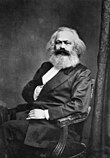| Part of a series on the |
| Marxian critique of political economy |
|---|
 |
In the theoretical works of Karl Marx and Friedrich Engels and subsequent Marxist writers, socialization (or the socialization of production) is the process of transforming the act of producing and distributing goods and services from a solitary to a social relationship and collective endeavor. With the development of capitalism, production becomes centralized in firms and increasingly mechanized in contrast to the pre-capitalist modes of production where the act of production was a largely solitary act performed by individuals. Socialization occurs due to centralization of capital in industries where there are increasing returns to scale and a deepening of the division of labor and the specialization in skills necessary for increasingly complex forms of production and value creation. Progressive socialization of the forces of production under capitalism eventually comes into conflict with the persistence of relations of production based on private property; this contradiction between socialized production and private appropriation of the social product forms the impetus for the socialization of property relations (socialism).[1]
In Marx's critique of political economy, as capitalism develops a contradiction emerges between the increasingly socialized act of production and the private ownership and appropriation of surplus value. Classical Marxist theory posits that this contradiction will intensify to a point where socialization of surplus value appropriation in the form of social ownership of the means of production will be necessitated, resulting in a transition from capitalism to socialism.[2]
- ^ Warhurst, Chris; Keep, Ewart; Grugulis, Irena (2004-02-27) [2004]. "Skill Trends Under Capitalism and the Socialisation of Production". The Skills That Matter. Palgrave (published February 27, 2004). pp. 242–260. ISBN 9781403906397.
.
- ^ Capital, Volume 1, by Marx, Karl. From "Chapter 32: Historical Tendency of Capitalist Accumulation": "Self-earned private property, that is based, so to say, on the fusing together of the isolated, independent laboring-individual with the conditions of his labor, is supplanted by capitalistic private property, which rests on exploitation of the nominally free labor of others, i.e., on wage-labor. As soon as this process of transformation has sufficiently decomposed the old society from top to bottom, as soon as the laborers are turned into proletarians, their means of labor into capital, as soon as the capitalist mode of production stands on its own feet, then the further socialization of labor and further transformation of the land and other means of production into socially exploited and, therefore, common means of production, as well as the further expropriation of private proprietors, takes a new form. That which is now to be expropriated is no longer the laborer working for himself, but the capitalist exploiting many laborers."
